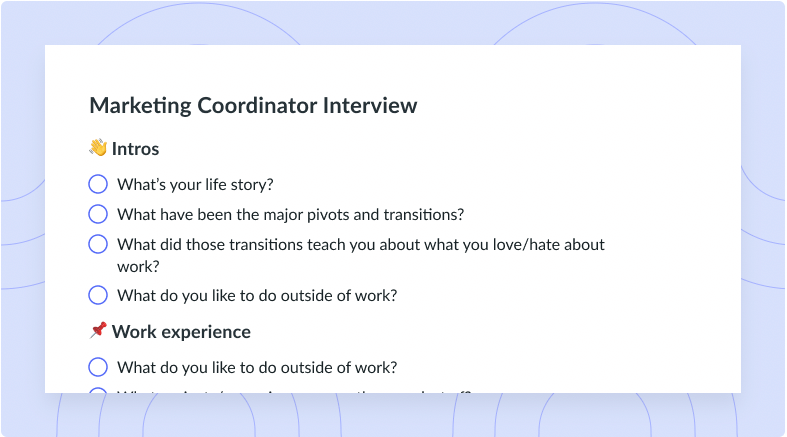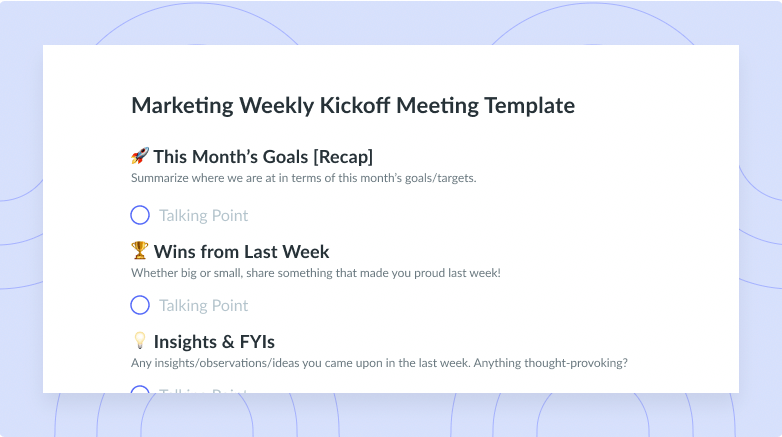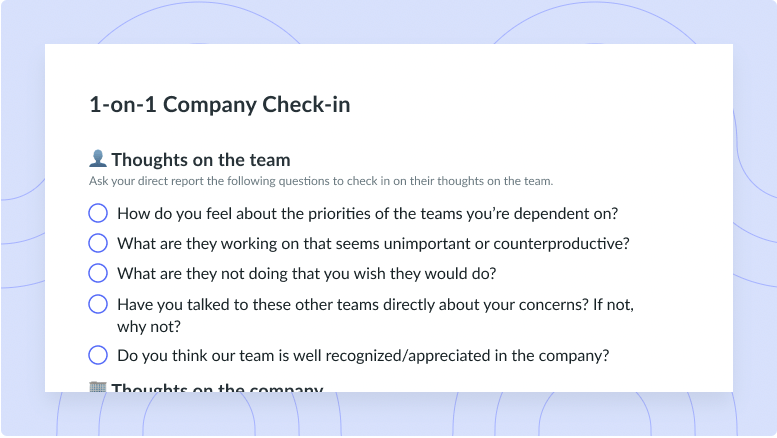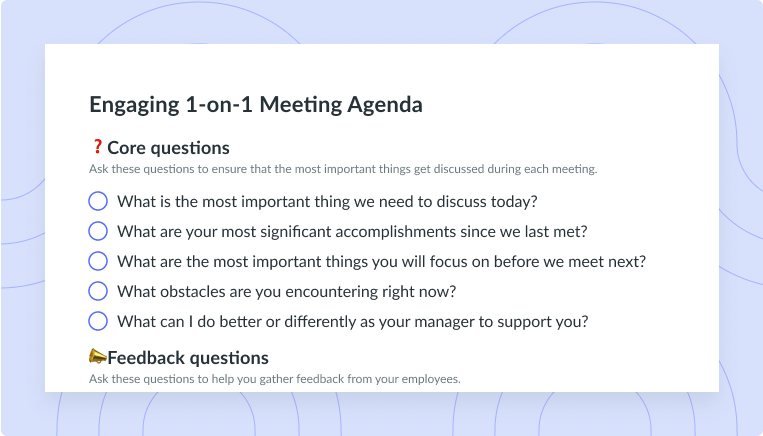Top 10 Lessons from Julie Zhuo’s The Making of a Manager
The Making of a Manager: What to Do When Everyone Looks to You – Julie Zhuo's guide to leading your team to new horizons.
Julie Zhuo is the Co-Founder of Sundial, a product strategy, data and design advisory firm for high-growth tech companies. She is Facebook’s former VP of Product Design. She has to lead a team of hundreds of employees who work on designing the experience that more than two billion people see when they tap the blue Facebook icon on their phones. However, Zhuo wasn’t always at the top of a world-renowned organization. She started working at Facebook as an intern and got promoted to her first management position at 25.
“All that I knew of management could be neatly summarized into two words: meetings and PROMOTION,” says Zhuo. “I mean, this was a promotion, wasn’t it? Everyone knows this conversation is the equivalent of Harry Potter getting a visit from Hagrid on a dark and stormy night, the first step in an adventurous and fulfilling career.”
Today, with nearly ten years as a manager under her belt, Zhuo hopes to empower managers around the world and help them understand that most managers (from sales to design, to engineering) go through the same experiences. This is why she released her new book, The Making of a Manager: What to do when everyone looks to you — in which she offers practical advice, relatable anecdotes, questions and exercises for modern managers looking to improve their leadership skills.
As Zhuo states in the book, “great managers are made, not born.”
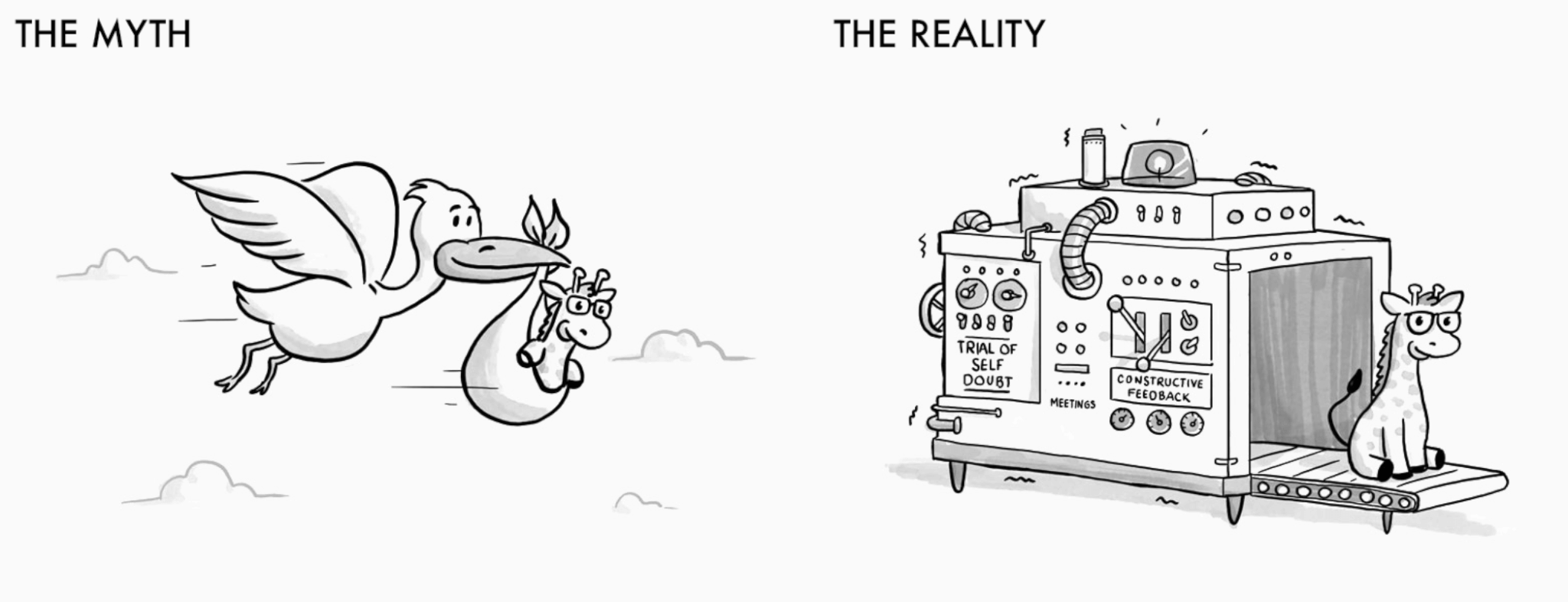
With Zhuo’s The Making of a Manager hot off the press, we’re excited to share the top lessons we learned from the book. If you’re a manager or hope to become one soon, these are ten things you should know:
- Getting better outcomes
- Your first months as a manager
- Developing trust with direct reports
- Running productive meetings
- Giving feedback
- Developing self-awareness
- Designing your team
- Mastering the art of delegation
- Investing in a healthy team culture
- Dealing with imposter syndrome
1 Your job as a manager is to get better outcomes from a group of people working together.
Even though the responsibilities of a manager include exchanging feedback, organizing great meetings, and creating processes to get work done smoothly, Julie Zhuo argues these activities don’t define a manager’s main job.
“If I asked you, ‘what is the job of a soccer player?’ would you say that it’s to attend practices, pass the ball to their teammates, and attempt to score goals? Of course not,” says Zhuo. “You’d tell me why those activities matter in the first place. You’d say ‘the job of a soccer player is to win games.’”
In the same way —Zhuo argues— your main job as a manager is to achieve great outcomes from a group of people that work together.
Julie gives a really good example to illustrate this point. Imagine you’re the owner of a lemonade stand, she says. And you hire two more people to help you out with your business.
“If the outcome you care about is building a thriving lemonade business, then a great manager’s team will turn a higher profit than a mediocre manager’s team. A bad manager loses money,” says Zhuo. “If the outcome you care about is getting amazing design, then a great manager’s team will consistently deliver concepts that wow.”
How does a manager help a group of people achieve great outcomes?
According to Zhuo, there are three areas that all managers should focus on to get a high multiplier effect on their collective outcome: Purpose, people, and process.
- Purpose: “The first big part of your job as a manager is to ensure that your team knows what success looks like and cares about achieving it.”
- People: “To manage people well, you must develop trusting relationships with them, understand their strengths and weaknesses (as well as your own), make good decisions about who should do what (including hiring and firing when necessary), and coach individuals to do their best.”
- Process: “For managers, important processes to master include running effective meetings, future proofing against past mistakes, planning for tomorrow, and nurturing a healthy culture.”

Great meetings are just the start
Level up your meeting habits to boost engagement and productivity with a collaborative meeting agenda. Try a tool like Fellow!
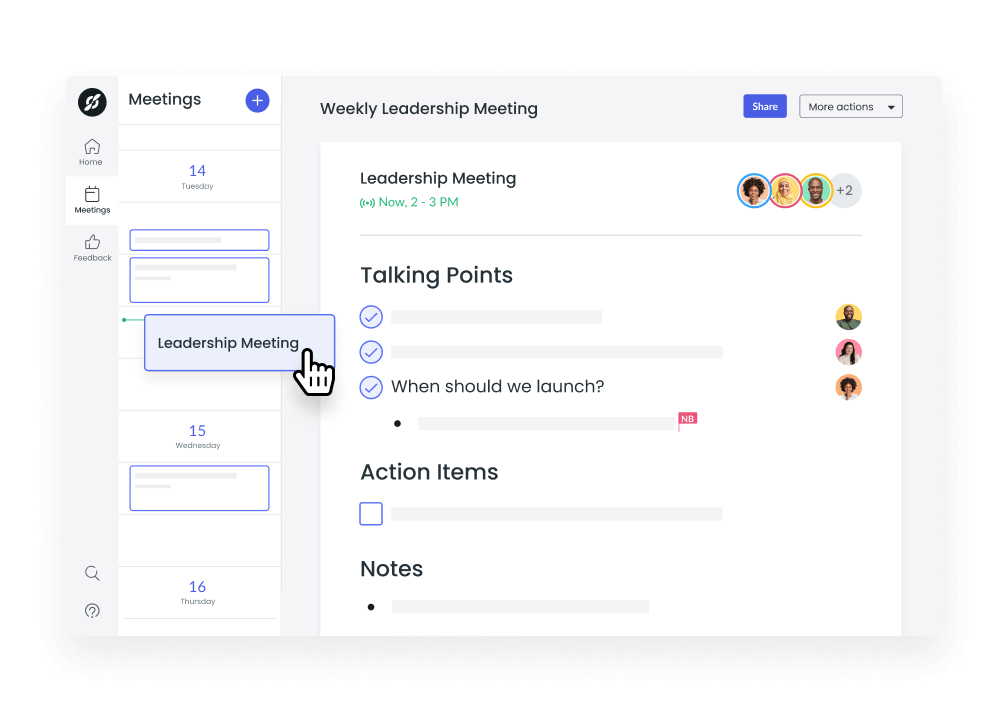
2 In your first few months, your primary job is to listen, ask questions, and learn.

Whether you are promoted as a manager in your current team (apprentice), are taking over your old manager’s role (successor), are a founding member of a new group (pioneer) or are joining a new team as their leader (new boss), your first three months should be about understanding your direct reports’ career goals, interests, and expectations.
In most cases, it’s important to start with a blank slate and give everyone the benefit of the doubt— no matter what you’re told. Avoid making assumptions based on rumours or comments you hear from other people about your direct reports, and try to ask as many questions as possible.
“Hopefully others will do the same for you. And be up front with people— especially your reports— about the kind of relationship you’d like to build and the kind of manager you want to be,” says Zhuo.
If you were promoted inside your team, it can feel awkward to establish a new dynamic with former peers. However, you shouldn’t avoid having conversations about career goals and priorities or asking your teammates about the traits that they like to see in a manager. If you think of yourself as a coach, and your direct reports see that your main goal is to help them achieve their goals, the awkwardness will eventually go away.
Here are some of the questions Julie Zhuo likes to ask her new direct reports:
- What did you and your past manager discuss that was most helpful to you?
- What are the ways in which you’d like to be supported?
- How do you like to be recognized for great work?
- What kind of feedback is most useful for you?
- Imagine that you and I had an amazing relationship. What would that look like?
On the other hand, here are some questions you can ask your manager:
- What will be my scope to start, and how do you expect it to change over time?
- How will my transition be communicated?
- What do I need to know about the people that I’ll be managing?
- What important team goals or processes should I be aware of and help push forward?
- What does success look like in my first three and six months?
- How can the two of us stay aligned on who does what?
Transitioning into a new management position isn’t easy. Even experienced managers (like Julie Zhuo) argue that getting used to a new role and all the responsibilities that come with it takes time:
“By the end of it, the day-to-day starts to feel familiar—you’re adapting to new routines, you’re investing in new relationships, and you may begin to have a sense of how you can best support your team,” says Zhuo.
3 Trust is the most important ingredient to develop a healthy manager-report relationship.
If your direct reports don’t tell you how they’re really feeling, you can’t do much to help them. This is why Julie argues that great managers strive to develop relationships of trust with their employees.

How can you know if you’ve accomplished this? According to Zhuo, you can tell that your direct report trusts you if the following three statements are true:
- “My reports regularly bring their biggest challenges to my attention.”
- “My report and I regularly give each other constructive feedback and it isn’t taken personally.”
- “My reports would gladly work for me again.”
One of the best ways to build trust with your direct reports and make sure those three statements are true is scheduling regular one-on-one meetings. As Zhuo argues in the book, these types of meetings are the ideal scenario to ask your employee about their challenges, long-term aspirations, motivation, and feedback.
“The most precious resource you have is your own time and energy, and when you spend it on your team, it goes a long way toward building healthy relationships,” says Zhuo. “This is why one-on-one meetings (1:1s for short) are such an important part of management. I recommend no less than a weekly 1:1 with every report for thirty minutes, and more time if needed. Even if you sit next to someone and see him every day, 1:1s let you discuss topics that may never come up otherwise.”
4 Preparation is the key to productive meetings.
“How can you achieve stellar 1:1s? The answer is preparation,” says Zhuo. “It’s rare that an amazing conversation springs forth when nobody has a plan for what to talk about.”
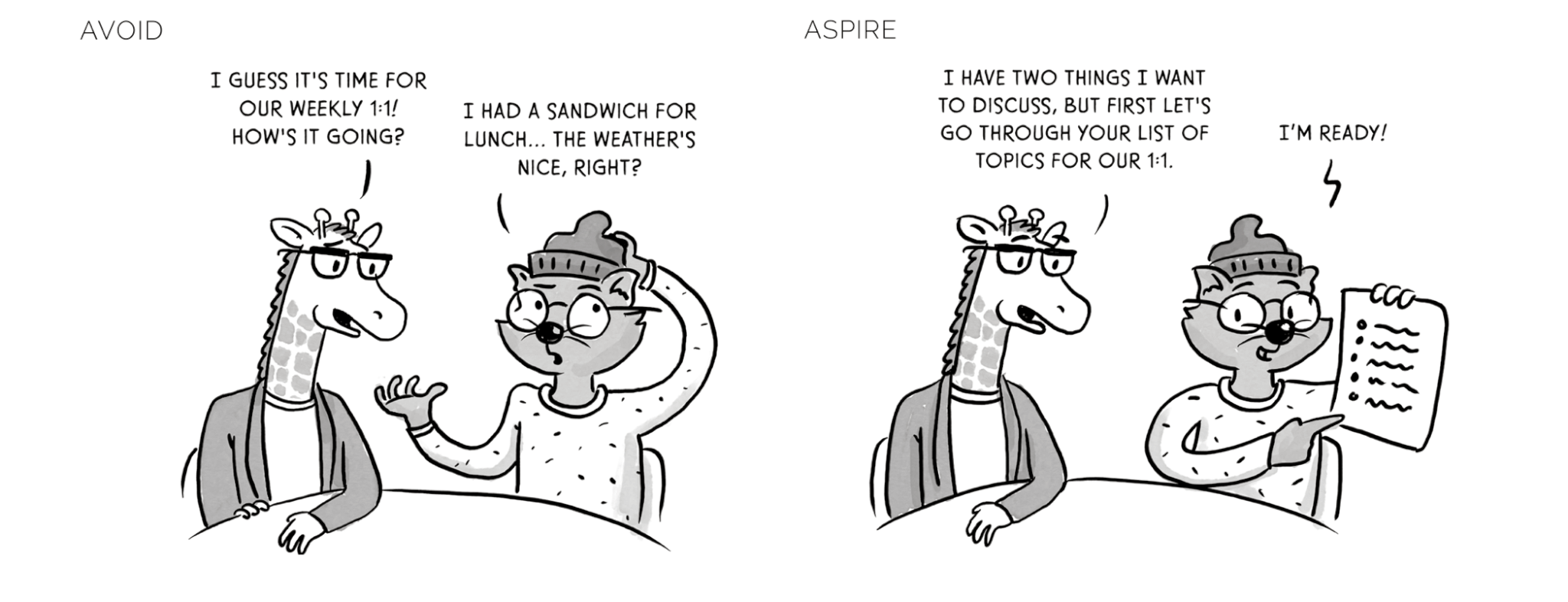
As a manager, you’ll be attending and hosting a lot of meetings. However, this shouldn’t be an excuse to show up unprepared.
“Every morning, I’ve gotten into the habit of scanning my calendar and compiling a list of questions for each person I’m meeting with,” says Zhuo “Why questions? Because a coach’s best tool for understanding what’s going on is to ask.”
Here are some of the questions you can ask your direct reports to understand what topics they want to discuss in your one-on-one meeting:
- What’s top of mind for you right now?
- What priorities are you thinking about this week?
- What’s the best use of our time today?
Once you identify what’s top of mind for your employee, you can move on to ask questions that help you understand the root of the problem and what can be done about it. Here are some of the questions suggested by Zhuo:
- What does your ideal outcome look like?
- What do you think is the best course of action?
- What’s hard for you in getting to that outcome?
Finally, you can ask questions to offer your direct report your support. Here are two questions that Zhuo likes to ask:
- What can I do to make you more successful?
- What was the most useful part of our conversation today?
Another key way to prepare for your meetings is by writing a meeting agenda ahead of time. When organizing a team meeting, collaborating on an agenda before the meeting starts shows that you want the group to stay focused and stick to the meeting’s purpose— but also want everyone to contribute to the discussion.
“It’s a good idea to do this for meetings of any size, even 1:1s, but the larger the meeting, the more important the preparation,” says Zhuo.
And of course, you should never leave a meeting without clear action items or follow-ups. As Zhuo states in the book, following up on previous action items is a great way to start your meeting:
“The follow-ups need to be treated with as much care as the preparation. A single meeting is not an end unto itself; it is a stepping-stone in the much longer path of creating something valuable for the world,” says Zhuo.
5 Feedback is a gift — and one of the most fundamental aspects of your job as a manager.
The fifth lesson every leader should learn from Julie Zhuo’s The Making of a Manager is that feedback is one of the most powerful tools you can use to help your team grow.
On the one hand, it’s always important to ask your employees if they find that your meetings are productive and if there’s anything you can do to improve them. In the book, Zhuo talks about an employee who let her know that her stand-up meetings could be replaced with an email update. Being his boss, she really appreciated the honesty:
“I left with a deeper appreciation of both the importance of planning good meetings and the value of giving feedback to improve bad meetings,” says Zhuo.
On the other hand, it’s crucial that you ask for feedback about your leadership style, and that you learn how to give ongoing feedback without making it awkward or difficult for your direct reports.
“Mastering this skill means that you can knock down two of the biggest barriers preventing your reports from doing great work — unclear expectations and inadequate skills — so that they know exactly where to aim and how to hit the target,” says Zhuo.
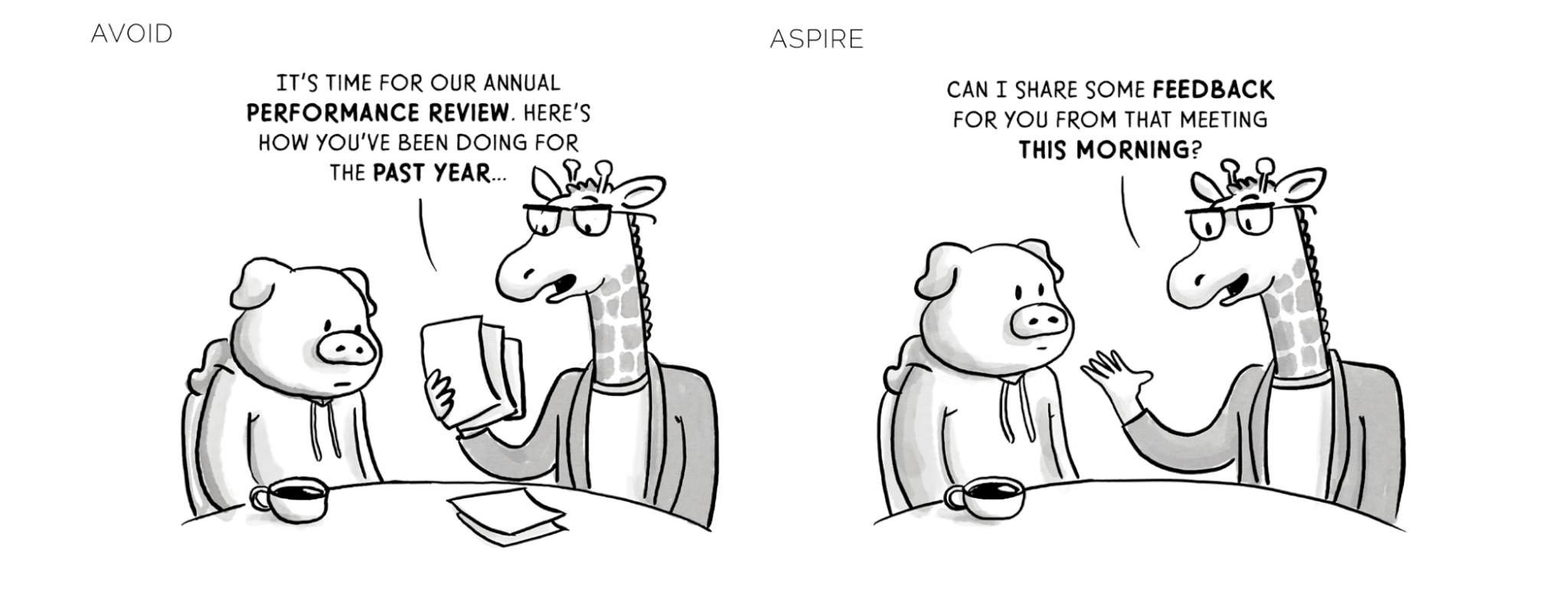
There are some specific things you can do to build a culture of guidance across your team. Here are four of the most common ways to inspire a change in behaviour, according to Julie Zhuo:
- Set expectations at the beginning: Address what a great job looks like, compared to a mediocre or bad job.
- Give task-specific feedback as frequently as you can: This can be done via email, chat, or a feedback app like Fellow within the day the task was finished.
- Share behavioural feedback thoughtfully and regularly: Record the feedback you give and try to connect the dots over time. Figure out what themes emerge and make sure your words are thoughtfully considered and supported with specific examples. Of course, it’s best to share behavioural feedback in person so the receiver can engage in a back-and-forth conversation.
- Collect 360-degree feedback for maximum objectivity: ask your direct report’s teammates about their strengths and weaknesses. This will help you get a more complete and objective view of how they’re doing.
6 Great managers are self-aware.
“Being a manager is a highly personal journey, and if you don’t have a good handle on yourself, you won’t have a good handle on how to best support your team,” says Zhuo.
One of my favourite lessons in the book is that every manager should develop a growth mindset. When you look at life from this perspective, you understand that you can get better at anything (including management), as long as you put hard work, curiosity, and time into your goal.
According to Zhuo, managing an entire team of people becomes much easier when you know what your strengths and weaknesses are.
“This is crucial because great management typically comes from playing to your strengths rather than from fixing your weaknesses,” says Zhuo.
Here are some questions that Julie suggests to help you understand your strengths and weaknesses:
- How would the people who know and like me best describe me in three words?
- What three qualities do I possess that I am the proudest of?
- When I look back on something I did that was successful, what personal traits do I give credit to?
- What are the top three most common pieces of positive feedback that I’ve received from my manager or peers?
- Whenever my worst inner critic sits on my shoulder, what does she yell at me for?
- What are the top three most common pieces of feedback from my manager or peers on how I could be more effective?
In order to be a successful manager, you must understand yourself at your best and your worst. This means understanding what types of environments help you be more productive, what type of skills you should continue to work on, and what feedback you should ask from your manager and direct reports.
Knowing yourself will give you the confidence necessary to empower other people on your team.
7 Design your team intentionally and make hiring great people one of your priorities.
Even when your organization is rapidly growing, hiring shouldn’t be just about filling holes. If you approach it that way, you’ll be hiring people just because you need someone to cover a position, and not because of their potential to make a positive impact on your company.

This is one of my favorite examples in the book: If you want to achieve a healthy diet, you should go to the grocery store on Sunday and plan your meals ahead of time. Similarly, planning what roles to hire for ahead of time will help you build the team of your dreams:
“One exercise I do every January is to map out where I hope my team will be by the end of the year. I create a future org chart, analyze gaps in skills, strengths, or experiences, and make a list of open roles to hire for,” says Zhuo.
Some other tips that Julie mentions in the book are writing the job description yourself (because no recruiter will know what an ideal candidate looks like), prioritizing diversity (by interviewing candidates from a diverse set of backgrounds, genders, and ethnicities), and doing extensive research when hiring leaders.
At the end of the day, bear in mind that one hiring decision can impact your team and your company for many years to come.
“As a manager, one of the smartest ways to multiply your team’s impact is to hire the best people and empower them to do more and more until you stretch the limits of their capabilities,” says Zhuo.
8 Mastering the art of delegation empowers both yourself and your direct reports.
As your organization and your team grow, the core principles of management will stay the same. However, day-to-day activities will change significantly:
“Setting a vision, hiring leaders, delegating responsibility, and managing communication become the key skills needed to bridge the gap,” says Zhuo.
This is why you should learn to master the art of delegation. In the book, Zhuo explains that one of the most common mistakes managers make is continuing to do IC (individual contributor) work past the point at which it is sustainable. However, according to her, the best managers are constantly looking for ways to replace themselves in the job they are currently doing.
“For the things that you do better than your reports, unless it falls into the ‘most important priorities’ bucket or you don’t believe they are set up to succeed, you should still try to delegate as much as possible and coach them along the way,” says Zhuo.
Delegating tasks and responsibilities empowers you to focus on bigger and better things for your team. On the other hand, it empowers your direct reports to take on new challenges and grow their skills.
Here’s an example from the book: Every Monday, Julie used to run a company-wide design meeting, which she ended up delegating accidentally (when she went on parental leave). When she came back to work, Zhuo realized that she should’ve handed off that meeting a long time ago, as she wasn’t giving it the attention and preparation it really deserved. Moreover, taking the lead in this meeting was giving one of her direct reports the opportunity to improve their public speaking skills and grow in their role.
“From this, you can extrapolate that anything your report can do just as well or better than you, you should delegate,” says Zhuo.
9 Invest in a healthy and positive team culture.
Management is not just about your relationship with your direct reports. It’s also about their relationships with each other, and with the team as a whole. This is why you should invest time and effort on nurturing a great team culture.
“Your team’s culture is like its personality. It exists whether or not you think about it,” says Zhuo. “If you’re not satisfied with how your team works together —maybe the vibe feels hostile instead of helpful, maybe it takes a long time to get things done, or maybe there’s constant drama— it’s worth examining why this might be and what you can do about it.”
Here are some tips from Julie Zhuo on the things you can do to nurture a great team culture:
- Have frank discussions about what your team should value and why.
- Talk to your direct reports when they showcase behaviours that don’t align with your team values.
- Invent traditions and rituals that celebrate your values (like hackathons that promote innovation, a customer love prize that promotes great customer service, an annual ceremony to reward people for showcasing company values, Monday morning yoga to promote mindfulness, CEO Q&A sessions to promote transparency, etc.)
- Always walk the walk: your team looks up to you, so make sure you’re setting the right example for them.
“Pay attention to your own actions —the little things you say and do— as well as what behaviours you are rewarding and discouraging,” says Zhuo. “All of it works together to tell the story of what you care about and how you believe a great team should work together.”

Team culture might not be your top priority or the first thing that crosses your mind when thinking about management. However, it is what determines your direct reports’ level of satisfaction and motivation to come to work— and that can have a huge impact on everything else.
10 Every manager feels like an imposter sometimes. Don’t let that stop you from learning and helping your employees.
“The perspective you have changes everything. With a fixed mindset, your actions are governed by fear — fear of failure, fear of judgement, fear of being found out as an imposter,” says Zhuo. With a growth mindset, you’re motivated to seek out the truth and ask for feedback because you know it’s the fastest path to get you where you want to go.”
In the book, Julie Zhuo describes many instances where she didn’t feel “experienced enough” or “determined enough” to be a good manager. However, she reflects back and argues that management is a learning process, and even when you have 10 years under your belt, you should continue to learn and find new ways to become a better leader.
“In another ten years, I know I’ll look back and realize that the path I’m on today is still squiggly. There is much left to learn, and I am far from being the manager I aspire to be,” says Zhuo. “But with time, will, and a growth mindset, the lessons ahead are right there for my taking.”
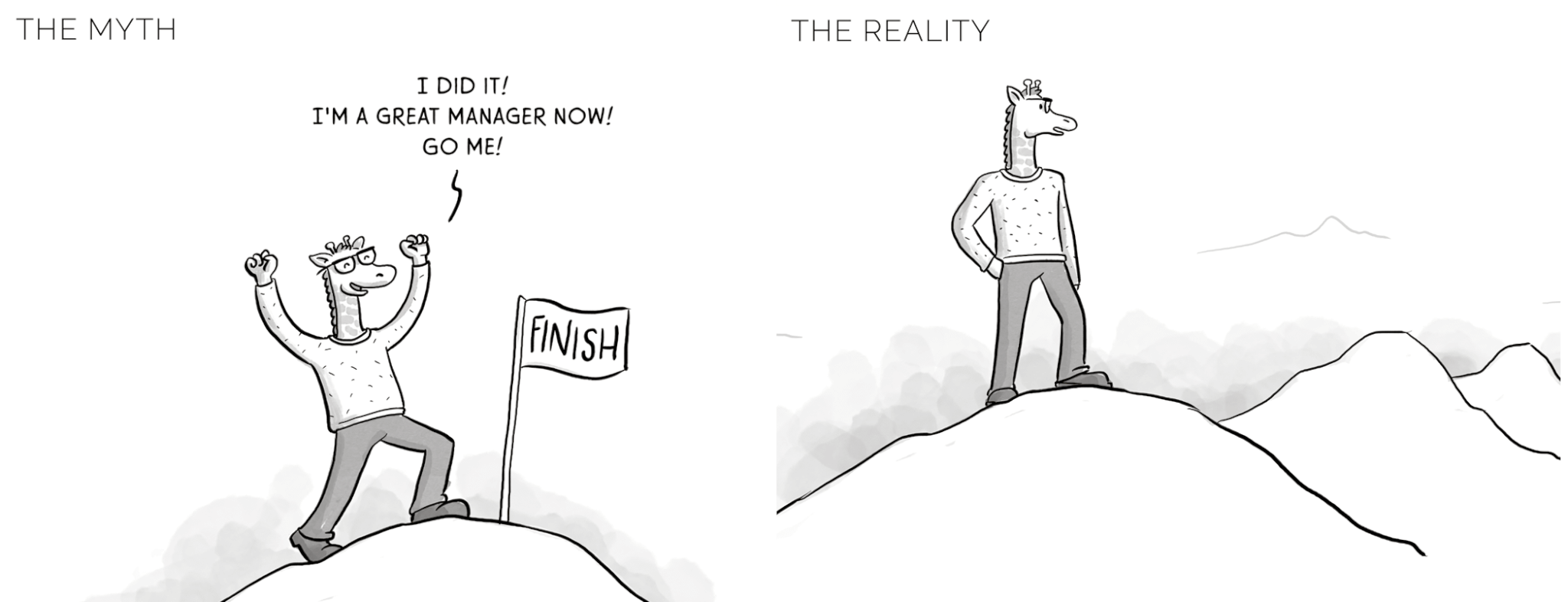
Being one of the first people (outside of Julie’s close friends and family) to read The Making of a Manager was a true honor. Thank you for sharing your experiences in such a candid and relatable way, Julie.
We hope this post will inspire many leaders to read your book, and develop the growth mindset, empathy, and confidence that all managers need.
You can buy Julie Zhuo’s The Making of a Manager here.










